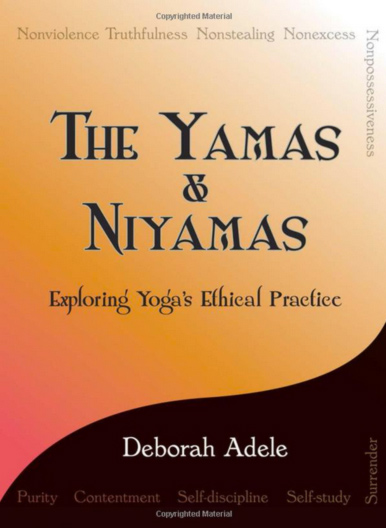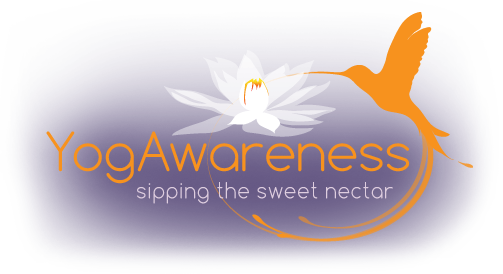
The Yamas & Niyamas by Deborah Adele
This is a very practical jewel for everyday living. The Yamas and Niyamas are part of the eight limbs of Yoga. They relate to our relationship with the world and with ourselves. When I went to India, I wanted to take the gist of her ideas with me; so these notes reflect HER summaries.
The Yamas – relationships with the world Ahimsa: Non-Violence
• Turns us away from harming self & others to kindness & compassion for self & others • Not over-scheduling oneself • Balance sleep, exercise, food, & spirituality; don’t deprive yourself of balance • Practice forgiveness rather than holding on to resentments • Trust others; don’t manage them • Practice compassion
Satya: Truthfulness
• Turns us from lies & half-truths to expressing our uniqueness & authenticity • Practice courage to speak and act with integrity. • Keep promises; follow through with your agreements • Be open to the possibility of truth changing over time • Stay present; your focus should be unwavering. Face the truth. • Be real rather than nice.
Asteya: Non-Stealing
• Turns us from theft to cultivating new skills & abilities • Celebrate other people’s success. • Don’t steal other people’s thunder or one-up them • Practice reciprocity; be generous • Take care of the earth’s resources for future generations. • Don’t cheat self from time to reflect & ponder • Build your adhikara (competence); plug the holes of your incompetence
Brahmacharya: Non-Excess
• Turns us from greed to appreciation & pleasure without excess • Practice non-excess w/ food, sleep, work, exercise, possessions, • Addictions lead to dullness; pull in the reins • Get off center stage • Dance with the Divine instead
Aparigraha: Non-Possessiveness
• Turns us from attachment to intimacy without possession • What we try to possess, possess us. • Let go of expectations and attachments; they’ll ruin your day. • Be generous and trusting • A bird cannot hold its perch and fly. • Exercise your adikara (competence) & let go of clinging to experiences, thoughts, emotions, habits & beliefs. • “Live fully in the experience of life w/o the burden of attachments or need to possess.” Swami Jnesheshvara
The Niyamas – Relationship with our self – Just how good can you feel? Saucha: Purify
• Invites us to cleanse our bodies, our speech, & our thoughts in preparation for the awakening of consciousness and compassion • As we lighten our load of toxins, we gain more clarity to greet each moment w/ clarity • Seek purity w/ each moment by allowing it to be as it is, not as you wish or expect. That includes your self as well as the world around you. No need to hide in fear from yourself. • Become a person who can sit comfortably & compassionately w/ another w/o fixing them. • Toxins can include food, thoughts of resentment… unforgiveness, clutter in your space, • Purifying: drink more water, forgive, clean your spaces, internal cleansing, fasting. • Arrive in the moment relaxed & spacious – not hurried. Exhale as a sweet closure. • Slow down & do one thing at a time; it will help you be present in the moment. • Purity asks that we make full & honest contact w/ the moment so there is nothing lost & no regrets; no residue.
Santosha: Contentment
• Invites us to fall in love with our own life (Dorothy from Wizard of Oz) • Like Caine, in Kung Fu, walk not in fear, instead meet each moment w/ curiosity & presence • Invite others into a deeper realization of their own abilities, strengths, & gentleness • Open your heart in gratitude for what you do have; practice not-seeking externally. • Avoid the “if only” game; don’t expect the world to meet your needs. Contentment is within. • Seeking & avoiding become expensive uses of our energy; things are neutral – we attach labels of things being appealing or repulsive; be unattached to your preferences. • Wisdom of a 116 year-old woman: “When it rains, I let it.” Don’t be a yo-yo. • Emotional disturbances are an inappropriate use of our energy. Don’t replay the stories; it keeps you out of your contentment. Self-importance leaves you open to being offended. • Practice gratitude as a tool to stay centered in unshakeable contentment. • Discontentment is the illusion that there can be something else in the moment. • When we do something in the moment to fulfill an expectation for another moment, we miss contentment. Exercising to look a certain way rather than for the joy of movement. • Wisdom from the mystics: There is nothing missing; life is complete the way it comes to us in each moment. Understand this and sink more deeply into contentment.
Tapas: Self Discipline
• Invites us to consciously choose discipline and growth • Tapas is growing our ability to stay in the unknown & the unpleasantness, rather than run in fear. It is the willingness to be both burned and blessed. • Make choices that build strength & character rather than being indulgent. • Practice staying “one more minute” in unpleasantness. Let the heat of it begin to burn away your judgments, opinions, & expectations.
Svadhyaya: Self – Study
• Invites us to know the core of self as divine consciousness • Unwrap each of the nesting boxes: beliefs, conditioning… • Trace your reactions back to a belief; courageously look at life as it is • Every comment you make about [the world] is a projection of yourself, and a clue to your interior landscape. • Every event life presents us is a precious opportunity to learn about the boxes we have ourselves packaged in. • We can’t be afraid to look; don’t shut the unpleasant parts of yourself away – carry them with kindness & compassion, knowing God lives there too. • “Denial cuts us off from the reality of ourselves.” Gandhi • Cherokee story: 2 animals inside us – the lamb & the wolf. Respect the wolf, feed the lamb. • Grow your ability to witness; it brings healing into your life. • Yogiraj Achala: The river only carries the pollution; the river itself is pure… like our mind. Identify with the Divine within you & merely watch the thoughts float by. The stories & beliefs are not who we are. • Meditation grows the inner witness. Experience yourself as supreme strength, the fullness of wisdom, & unquenchable joy.
Ishvara Pranidhana: Surrender
• Invites us to pay attention to what life is asking of us; there is a divine force at work • Invites you to surrender your ego, open your heart, & accept the higher purpose of being • Rhythm of surrender happens when you are in the flow, time disappears & you do too. • Monitor the moment to moment surrender by witnessing yourself contracting & expanding • When we need life to be a certain way, we get restricted & tight rather than open to the current of life. Each time we ride the rapids, we become a more skillful paddler. • Like an ice-chunk, let yourself melt into the flow of the stream. • Pay attention to the needs of the moment & courageously respond. • As a dance partner to life, we are asked to be vulnerable & undefended, and yet so present we can follow the next move. Understand what guides, nourishes, protects & cares for you • NOTICE any tension that arises when you need the moment to go your way. Consciously choose to relax your body and shift your attitude to curiosity. Watch what happens. • NOTICE: when you feel yourself shrinking away, trust that life is giving you a chance to step into a fuller, more skillful you.



Sorry, the comment form is closed at this time.